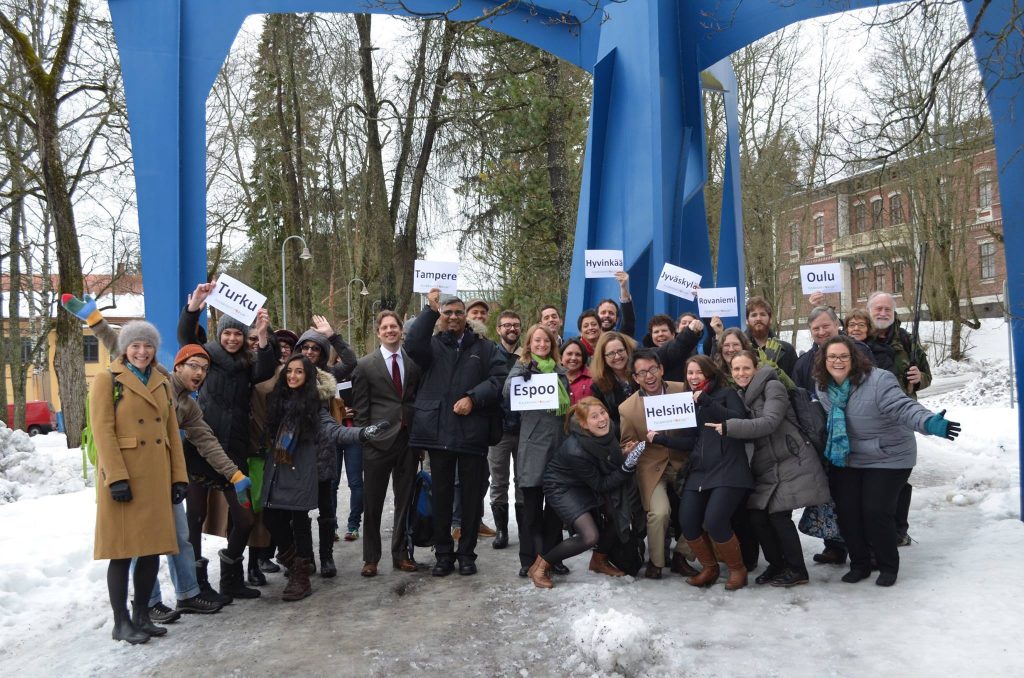Kenneth Lai graduated from UCI magna cum laude in 2014 with a B.A. in English Literature and a B.A. in Classics, additionally receiving the Chancellor’s Award of Distinction. He completed two UROP projects (2012–2014) under the guidance of James Steintrager. The subject of the former project (H.P. Lovecraft) was the topic of his UTeach classes (2013–2014). After graduating, Kenneth moved to Finland as a Fulbright student at the University of Helsinki to complete his M.A. in Religious Studies and is currently working on a teaching degree in the subjects of English, Latin, and Religion for Finnish public education. In the future, Kenneth hopes to pursue a PhD exploring the missionary practices of Manichaeism, an ancient religion that was practiced from the Roman Empire in the west to Tang China in the east and which now, because of the religion’s wide geographical spread, demands the equal cooperation of western and eastern scholars.
Tell me a little bit about your UCI experience. You were awarded a Fulbright and were a finalist for the Marshall. How did you connect with these opportunities?
I started as an English major and later wanted to learn Greek, so I learned Ancient Greek. My professors told me I was a good classicist, so I ended up double-majoring in English and Classics and graduated Magna Cum Laude. It was really cool because, in my year, we had Obama.
I understand you joined the Campuswide Honors Program and through them, you learned about the Fulbright and SOP.
Yes. I got to know about the CHP in my freshman year, and they exposed me to a lot of scholarship opportunities.
You learn a lot from CHP because the advisors are great and they fill you in on everything. I had Mary Gillis. She has this great memory and really personalizes the process, and I think all the advisors there do that as well. You just learn a lot by being in that environment. Students can be more scholarly-oriented in the honors’ program, and that’s what I have always enjoyed. I have always found it nice to connect with students who appreciate the same.
There are a lot of perks of being in the CHP. In general, it makes you very curious about things.
I think I may have learned about the Fulbright then. They definitely encouraged me to visit SOP.
What was your experience with SOP? Did you come into the office to get feedback for your Fulbright and Marshall applications?
I came in all the time. I was probably an annoying visitor. I went through the applications; I studied them and received good advice from Michelle Tsai.
CHP told me to go to SOP, so I made an appointment and started the application process. I remember it took me a long time.
Tell me about your Fulbright experience.
I was drawn to the Fulbright because I had heard so much about it and I wanted an opportunity to do a Masters somewhere. One of the many Fulbright opportunities is that they allow you to use a Masters Program as a Fulbright project.
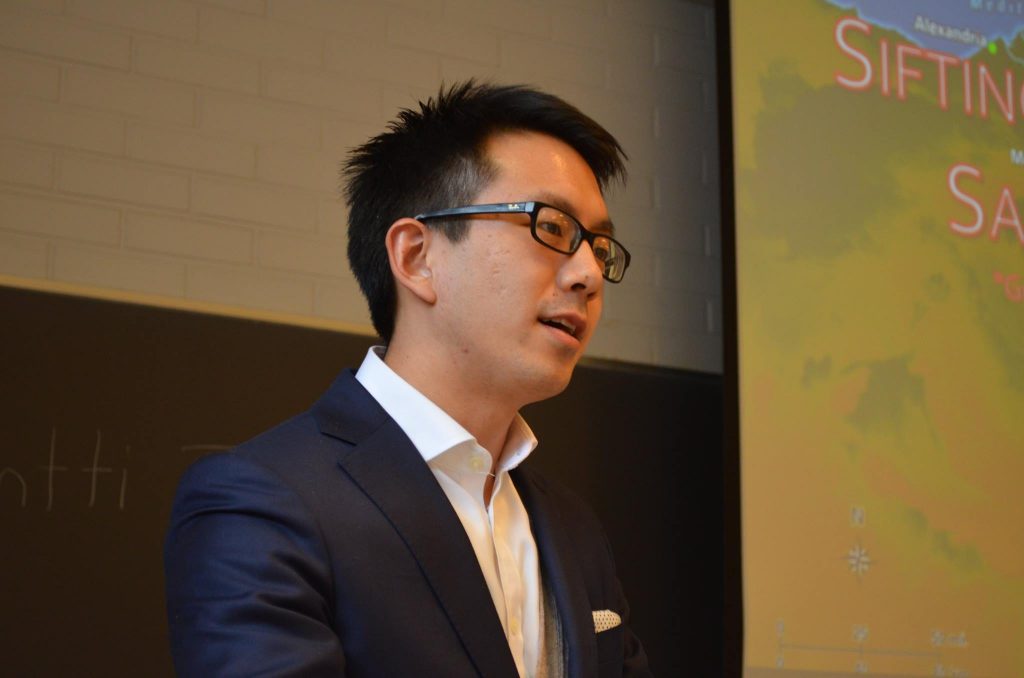 Kenneth Fulbright Presentation
Kenneth Fulbright Presentation
How did you narrow down what you would do for your Masters Program?
I wanted to broaden my experience to see if English or Classics, my two undergraduate majors, were the right options for me or another field that I was interested in. I looked for a field that would harmonize the abilities and language skills I developed in either discipline and found the perfect match in Religious Studies.
The Fulbright website lists many options you can pursue, and since I was interested in Finland, I looked into it and found out that there is a strong partnership between the Fulbright program and the University of Helsinki.
In fact, I learned later that Fulbright in Finland was one of the first Fulbright programs to launch, and they have been winning a lot of awards because they have created lots of different Fulbright opportunities, not just for students, but also for teachers in mid-careers who want to gain expertise in a different subject.
Once in Finland, who advised you academically?
It was actually Antti Marjanen. He’s been my main research advisor in Finland and my research project was in partnership with him. Initially, I looked into the Nag Hammadi Library, an Egyptian collection of early-Christian manuscripts discovered in 1945. I’ve since been interested in Manichaeism, an ancient Iranian religion with several key discoveries dating back to the 1890’s up until most recently the 1980’s, with some discoveries in Egypt.
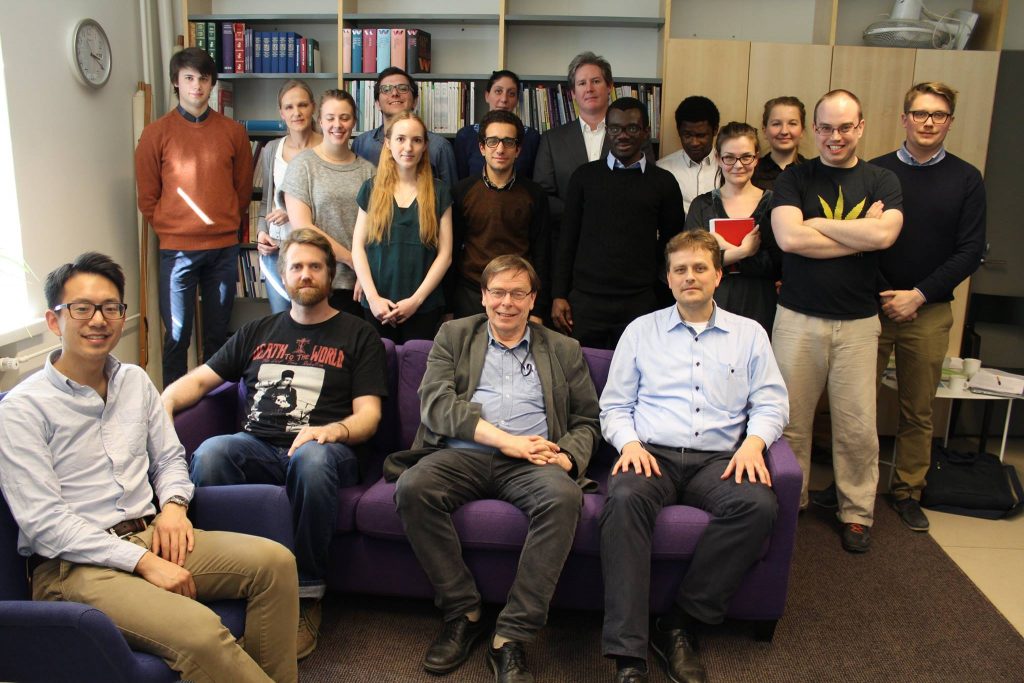 Master’s program after thesis symposium (advisor sitting in middle of couch)
Master’s program after thesis symposium (advisor sitting in middle of couch)
There is quite an active archeological society in Finland, and I’ve been really interested in following the different groups they have here: the Nordic Coptic Network and the Finish Egyptological Society, among others. There are a lot of research networks in Europe and lots of opportunities available for doing archeological studies as well as primary research.
My research is not archaeological in nature but many of my colleagues are archaeologists in background and at least some archaeology is always needed in ancient history research
Tell me about your experience in Finland. Were you well-prepared for it? Was there something that surprised you? What was a day in your life like?
I would say that I was rather prepared for the research part. But, I was completely unprepared for the living part because, as a native Californian, I had never experienced a proper winter before, so I was shocked to see snow.
Regarding adapting to the country, the Fulbright program in Finland prepared me well for the whole living process. They had a one-week seminar where they took us through how to set up a bank account, how to use the libraries in different locations, and how to contact different people. We were even introduced to some basic Finnish, which wasn’t entirely necessary because most Finnish people speak English and especially, in academia, their English is quite good.
I was unprepared regarding how to look for research material. In Finland, there is a long bureaucratic process before you can access research sources.
This was the biggest challenge for most of us, trying to contact the right people who had access to the materials we needed to look at. For example, at the national library it took us a couple of months to get access to some papyri that we needed.
In another case, a library had moved and lost some manuscripts, which was very unfortunate. The confusing part is that they don’t notify you online that they no longer have those manuscripts. That was the biggest challenge, knowing where your primary sources are. But I think this applies more to the humanities and social sciences than other fields.
Where did you live? Were there others with you? Was this more of a solitary journey?
None of it was really solitary. They have a buddy system. So, Fulbright alumni who are living in Finland partner up with incoming Fulbrighters and guide you through the whole process. In my case, I had 2 Fulbright buddies. One of them picked me up from the airport, and the other one had the responsibility of showing me around Helsinki. The Fulbright office had even arranged for an apartment to be set up for me, and it was very close to the university so I pretty much didn’t have to worry about anything when I got there. They had everything set up.
How would you describe your relationship with your mentor. Was it enjoyable? Did you learn a lot?
I would describe the process as a bit slow. I’m glad that my Fulbright period was a bit longer, (I’m completing a Masters), than the regular 10-month research stay. It is very difficult to develop a relationship with an advisor when you have a short time. Nordic people have a reputation for being a bit slow in terms of getting to know someone. In my case, it took me about a year before I got to know my advisor, but once that happened, it’s been a really fruitful relationship.
Now, we regularly read Coptic together. We participate in a reading group at the university, and we also read Greek, Latin, and Arabic together. He has even invited me to his cottage, where he even smoked the salmon himself, which was amazing. After the period of a year, I can say that I feel we’ve become good friends and good research partners.
How long will you stay in Finland?
I’m still there. I’m thinking about staying in Finland and doing a PhD. I’m currently living with my Finnish girlfriend who is now visiting California with me. She actually studies in the same university with me.
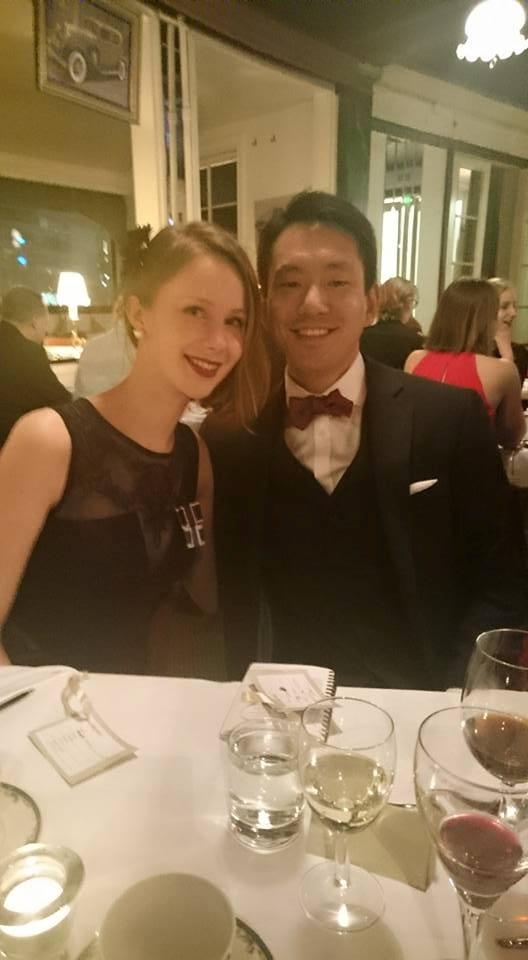 Me and Helmi (girlfriend) at an academic party
Me and Helmi (girlfriend) at an academic party
How did you craft your Fulbright application? How did you sell your case and what strategies did you use to get yours awarded?
The process was very long and arduous. There are lots of things you have to do and lots of recommendations. I went through many drafts including different motivation essays and research proposals.
I got to know my recommenders well. My undergraduate thesis advisor, James Steintrager, was a big role model for me. He was actually a Fulbright scholar himself.
As a student, how do you know what professor has completed a Fulbright? How do you find out?
I just happened to ask, and it turned out that my professor was one. In fact, many professors do complete Fulbright programs. Through word of mouth, if you ask your advisor in your department, they probably know who’s done a Fulbright.
How did you describe your project and what you wanted to do?
I described it as looking through primary sources that had been studied by my advisor and seeking to develop an American and Nordic collaborative effort. I think that’s the thing they are interested in: how you can connect different countries and, in my case, there was already an active Nordic community across national borders, interested in my topic.
How did your research contribute to a cultural exchange?
It helps when your research has an element of cultural ambassadorship. I included that in my project because I believe that’s the way that research should be done. Especially when it’s a very closed field like mine, 4th-century, Egyptian literature. The topic is not something that lots of people study, so it helps to have a mindset that you are working alongside different partners in your area.
Why does is Finnish government invested in this topic? Why is Finland interested in Egyptian literature?
The Finnish government cares about this topic because they have a Coptic collection in Finland, including papyri and parchment that remain unpublished. My advisor and other colleagues have been working on related Coptic material in early Christianity since the 80s. It’s something that has boosted Finland into an international reputation.
The Finnish government has been investing in this and similar projects since the 80s.The reason? I think that Europeans tend to have a different mentality from Americans. They don’t think, what is the benefit of this? They sort of think, what can we learn? Is there something to be learned?
That’s the litmus test they use when it comes to research in Finland, is the research valuable to those who are interested in it?
What skills are required to work with papyri and other related primary sources?
We are looking into unpublished papyri and there is a lot of interest in it because anyone in the field can learn from this finding. In order to study it, you need the material to be published. Yet, before you can study it you need to have very good language skills to unpack the content in the sources. For this reason, the project has always received investment and funding.
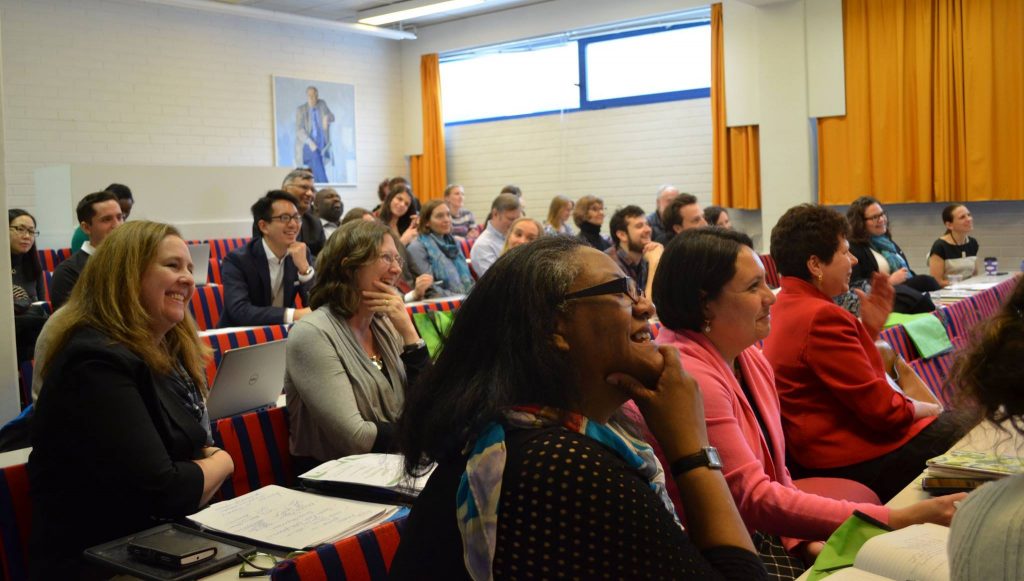 Fulbright seminar (upon arriving in Finland)
Fulbright seminar (upon arriving in Finland)
How many languages do you speak that are related to your research with primary works?
Manichaean texts are studied in a number of languages. I am able to read Ancient Greek, Latin, middle Iranian/Persian languages, Arabic, Hebrew, Coptic, and classical Chinese and have a fair grasp of French, German, and Italian. Many of these languages, I’ve been learning in the past years and during the Fulbright period. You have to know the ancient languages fairly well in order to understand the ancient primary sources.
How do you find the time to learn so many languages? What’s your process?
You surround yourself with people who are interested in the languages and you read literature with them. The nature of the texts is that they are written in such a way that reflect the way that in the ancient world there wasn’t this idea of one person speaking this one language, but rather, people spoke many different languages. One text might be in three different languages and they might be studied in three different languages. So you may have French commentary, a German commentary, and an English commentary. You sit down with a Hebrew text, Arabic text, and a Coptic text and you read the English, French, and German commentaries together and then in my case, you might have someone discuss it in Finnish, so you many have several different languages going on at the same time when you read one text. Once you get into this groove, you start picking up the language. You might also start studying some of the languages. I picked up Arabic and Hebrew. Once you learn one, the language family becomes a bit easier to grasp.
Much of it is self-taught. In my case, the Master’s program exposed me to some courses where I could learn some of these languages. The focus of my Master’s program is on the comparative study of emergent (Rabbinic) Judaism, Christianity, and Islam. There were thus teachers in Coptic, Greek, Latin, Arabic, Jewish Babylonian Aramaic, Akkadian, several ancient languages so I had those classes available and I had reading groups at the university as well as my own independent learning.
How does this connect to the application for the Marshall?
For the Marshall, I was using my English Literature background. For that application, I focused on Early Republic history. Specifically, American and British literature. So I was focusing on reading about early nationalism in the Early Republic of America. I was thinking of transatlantic studies, reading British and American literature comparatively, and trying to see what kinds of economic theories could emerge by reading these sources side by side.
What were you hoping to do?
The Marshall allows you choose from 2 Master’s programs that are each, one year long, or 1 Master’s program that is two years long. I was interested in the first option because my thinking was that I could expand my research knowledge in the field of English literature. So I was hoping to begin to do more theory-oriented research related to Britain and America at Warrick, then move to the University of Oxford from where I could look more closely at British literature in the early 19th century.
Did you apply to both at the same time?
Yes.
You were awarded the Fulbright and were a Finalist for the Marshall. What tips would you give students who want to pursue a Marshall?
The Marshall was another post-war creation. Read their website and learn about the beginnings of the Marshall scholarship and the special relationship between the US and the UK. Understanding the history of this relationship is critical to consider when applying. In fact, they ask you to describe what the special relationship is in one of their essays.
Some of my friends have gotten the Marshall through different universities and what I’ve noticed they are interested in is the relationship between America and the UK. What are you adding to the special relationship? How does your research probe and challenge the special relationship? In my case, I didn’t especially develop my research topic to suit this, but I was working on my undergrad thesis trying to find a way to relate it to the question.
I found this research field in transatlantic literature, exchange, and proto-nationalism and was hoping to connect my findings to the modern relation between British and American writings and the British and American political system. This is something that they are very interested in.
The Marshall, although better funded than the Fulbright, would have required that I move to 2 different cities within one year. It is designed for people committed to British-American related fields.
I wanted more of an international experience. In the ancient world, things were very messy. There wasn’t one location or one language.
The Fulbright worked out much better for the type of work I wanted to do. I was able to get that international feeling just being among different scholars and learning a language that wasn’t English. Being exposed to different languages is something I really value. I would have gone for the Fulbright had both opportunities manifested at the same time.
With the Marshall, they want you to stay in the UK.
What advice would you give students who are contemplating a Masters through a Fulbright?
Master’s program: Look for opportunities that interest you. I was drawn to the pan-Nordic emphasis of this Master’s program, which include universities in Norwary, Sweden, Denmark and Finland and you travel to each university for 1 week for a contact seminar. I was interested in meeting different professors, developing a relationship with them and exploring if their research was compatible with mine so I could pursue a Ph.D with them afterward.
Doing research: look at what’s unique about the country. Regarding Finland, not many people know that there is this papyri in Finland; you wouldn’t think to look here, but there is a lot to be published in Finland. Look for unique sources or unique circumstances. Some of my colleagues want to come here specifically to study the Arctic or to do Cardiac Research in the Finnish population because they are a rather close society; they have a rather uniform gene pool. Something like this gives a uniqueness to your research approach.
Generally, whether you are going for a Masters or a research-oriented project, the biggest thing is thinking of being a cultural ambassador. What are you adding to the local research community and the community in general?
I noticed that all the Fulbrighters when they got there, were interested in Finnish culture. We all had some language background or were interested in learning it while we were there. We were interested in the culture, technology, anything that was Finnish. We generally had an idea of what we were interested in.
That’s the biggest thing. You have to be interested in the country and the culture.
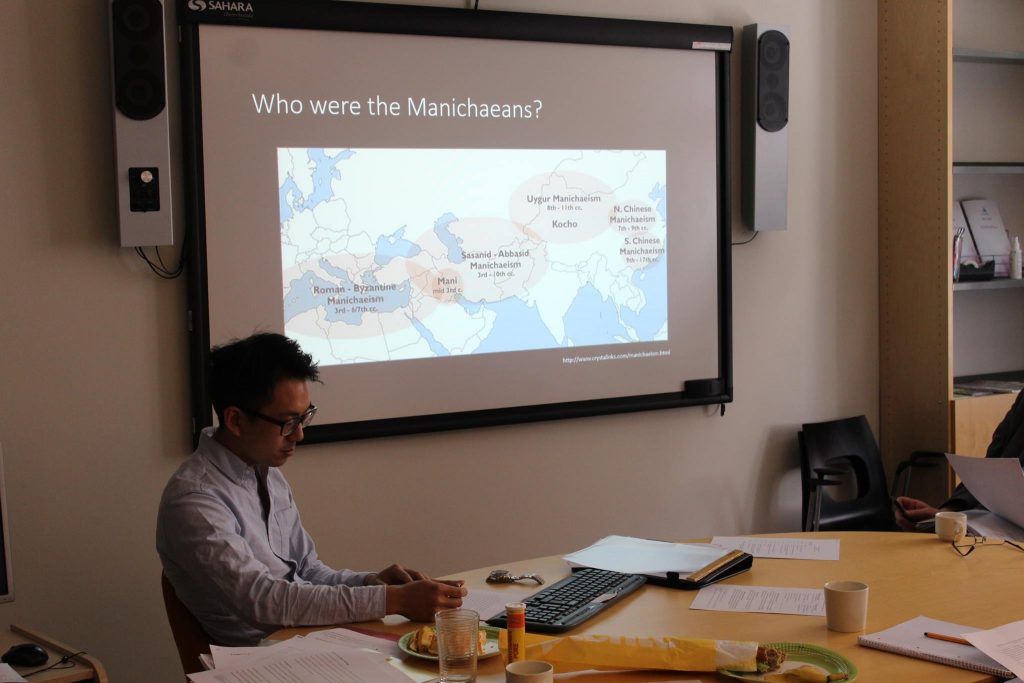 Master’s Thesis Presentation about Manichaens
Master’s Thesis Presentation about Manichaens
Why is it important to focus on connections?
It comes from this idea that the Fulbright comes from a post-war setting. So, there is something that is nationalistic about it. The people who work at the Fulbright center do want to see something that relates America and their respective country. It might be a bit of an old argument but it does still apply.
I think it’s still about prestige and about uniting researchers in different countries with each other. If you think about how after the war, countries were so divided, through the Fulbright process, you can rebuild relationships. We are more advanced now, but the idea of understanding, and collaboration is still something they want to work on.
For you, what came first, the region or the topic?
I think they came at the same time. I was already interested in a couple of topics and in religious studies, in particular. When I found my advisor, I explored my advisor’s interests to see if they would be a good fit.
You mentioned earlier that the Fulbright experience is about a relationship, about collaborating. What have you brought to Finland as a contribution?
At this point, I’ve taken up a teaching degree in Finland. I’m studying to be a teacher in English, Latin and Religious Studies for secondary school. I want to contribute as someone who specializes in these fields, as someone who has done some research here and teach high school students within a realm of relatively good expertise.
Also, learning Finnish is another contribution. I would like to contribute to different publications in the language by collaborating with Finnish researchers. More specifically, I would like to publish in American journals alongside Finnish collaborators.
I’m still working on these contributions. They are not fully accomplished yet, but I’ll continually work on them.
If I were to ask you, how has the Fulbright process changed you? Have you grown as a result of this experience in Finand?
Yes. I’ve become a better researcher; I’ve become more aware of international relations, and I’ve become aware of Europe in general. I’ve come to value my time at UCI more than I had expected. I think this is because while being in Finland, I’ve become aware of the different institutional settings and how universities work in America versus in Europe and the role of politics in these settings. The EU was rather elusory to me while I was in America, even though I had worked in German and French and had even received a scholarship from the European Studies Department at UCI. Being here you learn so much about every country. You see the U.S. in a different light, not only in light of the recent election, but reading about your own country while being abroad is also a learning experience. You see first hand, how the outside world processes your country’s politics.
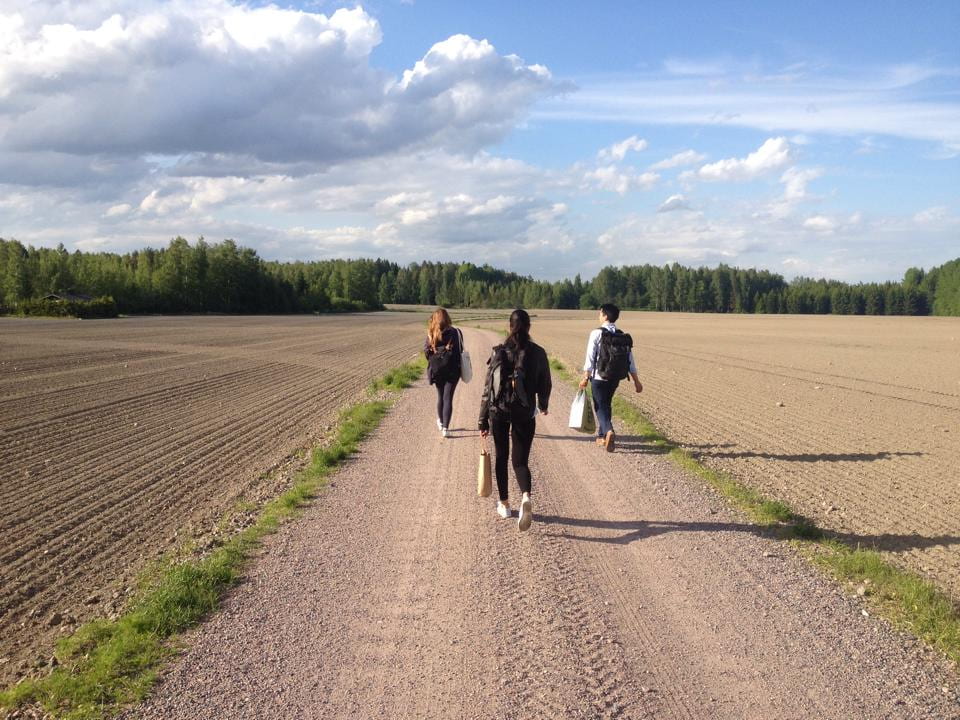 Traveling with some friends to a cottage
Traveling with some friends to a cottage
Do you feel like being abroad made you more patriotic and brought you closer to America or distanced you?
I think I’ve become more of both. I’m more well-informed and in general, it’s made me a better American. I can better compare the history of America vs. other countries and I’ve had many opportunities to talk about this. I’ve met many Europeans who are interested in learning about how Americans think of their own country in light of recent events.
Especially as an Asian-American, it is shocking for Europeans to think of Americans as not being white, male and fat. I get that all the time. Most people think I’m Chinese. They start talking to me in an Asian language that they’ve learned. I tell them, I’m American, actually. I do speak Mandarin, though. It’s an educational process for Europeans as well. Thanks to the program, they get to meet many different types of Americans.
What is next for you?
In the end I would say, research. I find research to be very rewarding. It is hard work, sometimes solitary work and you can also meet a lot of people. In the end, we share the research with people so it’s never completely solitary. It’s as solitary as you want to make it, I would say. Some people work alone and it’s detrimental to their social life. But, if you take it upon yourself to connect with others then it becomes a very cooperative, rewarding work. This applies to whether you are working as a researcher or a teacher. I see myself teaching in Finland, and I would be satisfied either way, working in research or as a teacher. After all, in Finland, a teacher is a researcher. You have to have a Masters degree to teach in Finland.
Do you have any final words of encouragement for prospective candidates?
Many students seem too daunted by the prestige and the long application process of big scholarships that they disqualify themselves before applying. Just go for it. The road is long, but the journey is well worth the trials. Listen closely to your advisors and, most importantly, stay curious.
I want to say that I’m really grateful for SOP. They gave me a lot of confidence through the preparation process and the interview drills. They gave me so much information about what I had to do. So I’m very grateful that SOP is there in UCI and that you guys are so dedicated to helping students out.
If you would like to learn more about Kenneth’s research and experiences, he can be contacted at kenneth.w.p.lai at gmail.com

